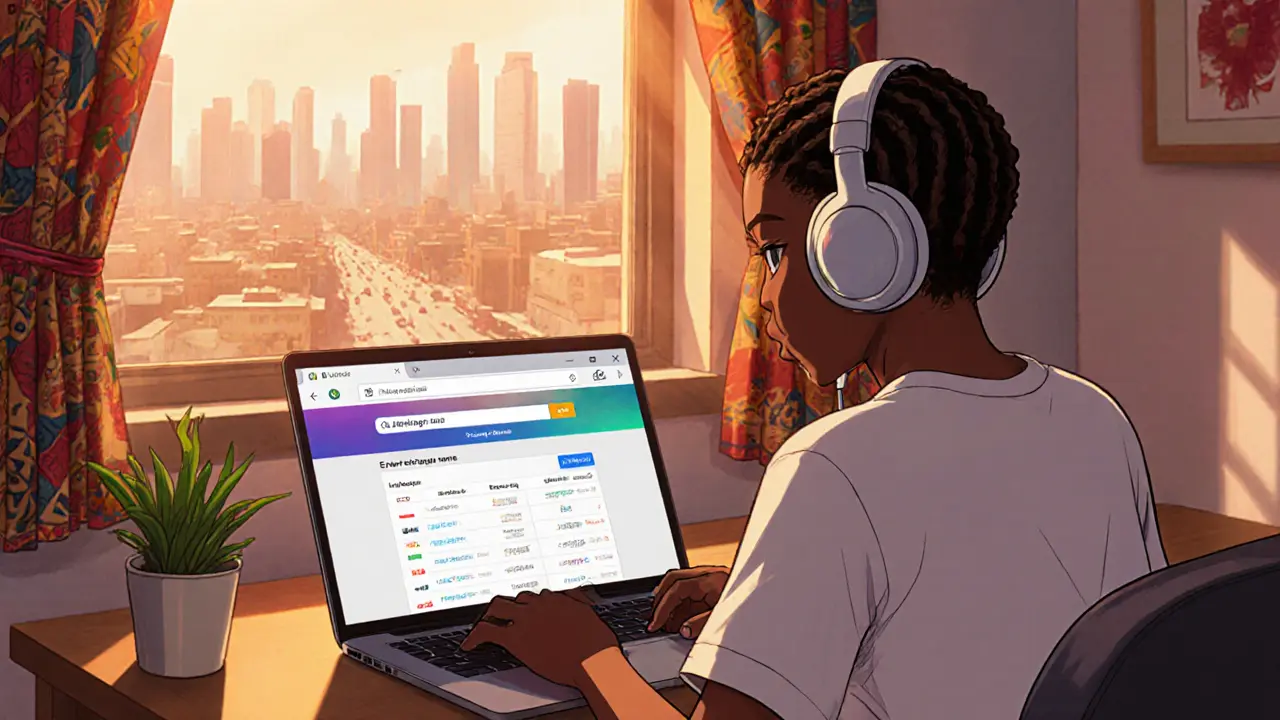Nigerian Crypto Exchange Checker
Check Exchange Status
Enter the name of a crypto exchange to see if it's licensed to operate in Nigeria.
Licensed Exchanges in Nigeria (2025)
Quidax
LicensedFull NGN deposits & withdrawals. SEC approved since July 2024.
Busha
LicensedLow fee transfers with bank integration. SEC approved since September 2024.
Banned/Unlicensed Exchanges
Binance (Naira-P2P)
UnlicensedBlocked for fiat transactions. Crypto-to-crypto still works via VPN.
Coinbase
UnlicensedOfficially inaccessible in Nigeria without VPN.
Kraken
UnlicensedAPI blocked. Not licensed by SEC.
Huobi
UnlicensedListed on SEC’s non-compliant register.
Nigeria’s crypto market is booming, but the rules have changed fast. If you’re wondering which platforms you can’t use, what the law actually says, and how to keep your funds safe, this guide breaks it all down in plain English.
Quick Takeaways
- Unlicensed exchanges are effectively prohibited by the Securities and Exchange Commission (SEC) under the Investments and Securities Act 2025.
- Binance’s Naira‑P2P service and direct fiat on‑ramps are blocked, but crypto‑to‑crypto trading still works via VPN.
- Licensed Nigerian platforms such as Quidax andBusha can operate legally, provided they meet AML/KYC standards.
- Check the SEC’s official licence register before signing up with any exchange.
- Non‑compliant use may trigger fines of up to ₦10million for the first month of violation.
Regulatory Landscape in a Nutshell
Nigeria introduced a sweeping overhaul of its digital‑asset rules in March2025 with the Investments and Securities Act (ISA) 2025. The law treats most cryptocurrencies as securities, putting them under the jurisdiction of the Securities and Exchange Commission (SEC). The SEC now issues licences to any crypto exchange or Virtual Asset Service Provider (VASP) that can prove robust AML, KYC, and transaction‑monitoring capabilities.
Parallel to the ISA, the Nigeria Tax Administration Act (NTAA) 2025 adds a tax‑compliance layer that will kick in from 2026, imposing penalties for delayed reporting. The Central Bank of Nigeria (CBN) also plays a role by allowing banks to service licensed crypto businesses - a reversal from the 2021 blanket ban on crypto transactions.
Which Exchanges Are Effectively Banned?
The SEC’s enforcement powers mean that any platform lacking a valid licence is prohibited from operating in Nigeria. Below are the most visible cases as of October2025:
- Binance (Naira‑P2P services) - In February2024 the platform stopped Naira deposits and withdrawals on its peer‑to‑peer market. Telecom providers also blocked the domain, forcing users to rely on VPNs for any access. The ban applies only to fiat‑on‑ramps; crypto‑to‑crypto swaps still function.
- Coinbase - Never obtained a Nigerian licence, so its website and mobile app are officially inaccessible from local IP addresses. Users report complete lock‑out unless they use a VPN.
- Kraken - Similar to Coinbase, Kraken has not applied for SEC approval. The platform’s API endpoints are blocked, making automated trading impossible.
- Huobi - Listed on the SEC’s “non‑compliant” register in early2025 and faced temporary domain seizure by the Nigerian Communications Commission.
- Local unlicensed peer‑to‑peer sites - Numerous small P2P hubs that sprang up after the 2023 CBN relaxation were shut down after SEC inspections in mid‑2024.
These bans are not “black‑list” in the traditional sense; rather, the SEC can suspend or revoke any operating licence. Because most of the listed exchanges never secured a licence, they are automatically barred.
Licensed Exchanges You Can Use Legally
Operating within the law is simpler than you think - just pick a platform that appears on the SEC’s official licence register. The two most prominent Nigerian licences so far are:
- Quidax - Received its SEC licence in July2024. Offers fiat‑NGN deposits, spot trading, and a modest DeFi sandbox.
- Busha - Approved in September2024. Focuses on low‑fee transfers and integrates directly with selected Nigerian banks.
Both platforms adhere to the SEC’s AML/KYC checklist, maintain real‑time transaction monitoring, and publish quarterly compliance reports.

How to Verify an Exchange’s Licence
- Visit the SEC’s VASP licence register (the URL is public and does not require authentication).
- Search by the exchange’s legal name - not the brand name only. For example, “Quidax Limited” rather than just “Quidax”.
- Check the licence expiry date and any attached compliance notes.
- Confirm the exchange displays the SEC registration number on its website’s footer or “About” page.
- If you’re uncertain, contact the SEC’s consumer‑help desk via the listed phone number or email.
Never trust a screenshot alone; always cross‑reference with the official register.
Practical Steps for Nigerian Crypto Users
- Stick to licensed platforms. They provide legal protection and smoother banking integration.
- Avoid VPN‑only solutions for fiat transactions. While VPNs can unblock Binance’s crypto‑only features, using them for Naira deposits may expose you to tax and AML violations.
- Maintain proper records. The upcoming NTAA will require you to report crypto gains. Export your trade history from the exchange monthly.
- Watch for SEC announcements. The commission issues press releases whenever it adds or removes a licence.
- Consider the sandbox. If you’re a fintech startup, the SEC’s regulatory sandbox allows you to test innovative services under a provisional licence.
Risks of Using Banned Exchanges
Operating on an unlicensed platform can trigger several penalties:
- Immediate freeze of Nigerian accounts linked to the exchange.
- Fines of ₦10million for the first month of non‑compliance, plus ₦1million per additional month (≈ $6,693 and $669 respectively).
- Potential criminal investigation by the Economic and Financial Crimes Commission (EFCC) if AML checks are deemed insufficient.
- Loss of recourse - unlicensed platforms are not covered by Nigerian consumer‑protection statutes.
Comparison Table: Banned vs Licensed Exchanges (2025)
| Exchange | Licence Status | NGN Fiat Support | Typical Penalties for Unlicensed Use | Work‑around Needed? |
|---|---|---|---|---|
| Binance (Naira‑P2P) | Unlicensed (blocked) | No (only crypto‑to‑crypto) | ₦10M first month + ₦1M/month | VPN for crypto‑only |
| Coinbase | Unlicensed (inaccessible) | None | Same as above | VPN required for any access |
| Kraken | Unlicensed | None | Same as above | VPN required |
| Quidax | Licensed (SEC) | Full NGN deposits & withdrawals | None (compliant) | No |
| Busha | Licensed (SEC) | Full NGN support | None (compliant) | No |
What’s Next for Nigerian Crypto Regulation?
Analysts expect the SEC to issue more licences in 2026, especially to international players that can demonstrate local AML infrastructure. The NTAA will introduce withholding‑tax reporting for crypto‑related earnings, so keeping clean records now will save headaches later. Keep an eye on upcoming guidance around stablecoins and DeFi protocols - the SEC has hinted at separate licences for those sectors.

Frequently Asked Questions
Is Binance completely banned in Nigeria?
No. Binance’s Naira‑P2P service and direct fiat deposits are blocked, but crypto‑to‑crypto trading still works. Users must use a VPN to bypass the domain block, which operates in a regulatory grey area.
How can I tell if an exchange is licensed by the SEC?
Check the official VASP licence register on the SEC website, search by the legal company name, verify the licence number on the exchange’s site, and confirm the expiry date.
What penalties do I face if I use an unlicensed exchange?
The 2025 law imposes a ₦10million fine for the first month of violation, plus ₦1million for each additional month, plus possible criminal investigation by the EFCC.
Are there any Nigerian exchanges that support USDT or other stablecoins?
Both Quidax and Busha offer USDT trading pairs and have integrated stablecoin wallets, all under their SEC licences.
Will the upcoming NTAA affect my crypto taxes?
Yes. Starting 2026, crypto gains must be reported for withholding tax. Maintaining monthly trade logs now will simplify compliance later.


Comments (20)
Great overview, thanks for pulling all the details together. The distinction between licensed platforms like Quidax and the blocked services such as Binance’s Naira‑P2P is crystal clear. For anyone just starting out, checking the SEC’s VASP register should be the first step. Keep the updates coming, it really helps the community navigate the shifting landscape 😊
Spot on, the register check is key.
This guide is just a rehash of the SEC press releases, nothing groundbreaking. People keep asking why Binance is “blocked” when crypto‑to‑crypto still works via VPN. The author glosses over the real issue: the lack of enforcement on offshore platforms. If you’re looking for actionable advice, you’ll need more than a copy‑paste table. The regulatory part is fine, but the analysis is superficial at best.
Hey, let’s keep the focus on what users can actually do. Even if Binance’s fiat lanes are shut, the crypto‑only routes still let traders stay active. Leveraging a VPN responsibly can bridge that gap while you wait for a licensed alternative to roll out. Remember, staying compliant with AML/KYC is the smartest move for long‑term success. Keep the momentum and explore the local options!
As a Nigerian, I have to say the SEC finally got its act together, but the government should have acted sooner. The ban on Binance’s Naira‑P2P was inevitable given the rampant fraud we saw. Our local exchanges like Quidax and Busha are doing a solid job supporting the economy. Anyone still trying to use unlicensed foreign sites is just risking their hard‑earned Naira. Let’s champion home‑grown solutions.
yeah the local options are decent they’ve got real bank links but the VPN thing still works for crypto only trades
Oh sure, because checking a website is such a massive hurdle.
It’s actually helpful to have a quick checklist – just type the exchange name and see the status instantly.
I understand how confusing the rules can feel, especially with the mix of bans and licences. The fact that some services still work through VPNs adds another layer of uncertainty. It’s good to keep records and stay aware of the SEC register. This guide gives a clear starting point for anyone feeling lost.
Wow, this is sooo helpful!! I was totally clueless about which exchanges are actually ok 😅. Thanks for breaking it down in plain words, love it 💖.
Great guide – stay safe and trade smart!
Thx! I think more people will read this now and avoid costly mistakes.
They’re probably hiding the fact that a lot of these “licensed” platforms are just fronts for the same money‑laundering schemes the SEC pretends to crack down on.
Look, the SEC does what it can, but the real enforcement comes from the banks and the EFCC – keep your eyes on those channels.
The step‑by‑step verification method you outlined is exactly what newcomers need to feel confident navigating the regulatory space.
In the grand tapestry of digital finance, each licensed exchange is a thread of legitimacy, while the unlicensed ones loom like shadows of ambition, waiting to be illuminated by law.
What a thorough compendium – truly a treasure trove for anyone dabbling in the Nigerian crypto ecosystem. First, let’s applaud the clarity with which the author separates licensed players like Quidax and Busha from the grey‑area giants such as Binance and Coinbase. The narrative weaves together regulatory history, tax implications, and practical steps, making it a one‑stop shop for both novices and seasoned traders. By highlighting the SEC’s VASP licence register, the guide empowers users to perform due diligence without chasing rumors. The inclusion of concrete penalties, down to the exact Naira amounts, adds a sobering realism that many articles gloss over. Moreover, the practical advice about maintaining trade logs in anticipation of the NTAA is a forward‑looking gem that will save countless headaches later. The table format is especially handy – a quick visual cue that instantly tells you which exchange supports NGN fiat and which requires a VPN. I also appreciate the note on the regulatory sandbox, hinting at future innovation pathways for fintech startups. While the piece could have dug deeper into the technicalities of AML/KYC compliance, it nonetheless offers a solid foundation. Readers are reminded to verify the licence number on the exchange’s website, a detail that can prevent phishing scams. The discussion of stablecoin support on Quidax and Busha is timely, given the rising interest in USDT and other tokens. The author’s calm tone balances the underlying tension between government oversight and user freedom. It’s evident that the landscape is still evolving, with more licences expected in 2026, which keeps the community on its toes. The guide also wisely warns against over‑reliance on VPNs for fiat transactions, underscoring the legal risks. All in all, this article stands as a beacon of informed vigilance, encouraging responsible participation in the ever‑growing crypto market of Nigeria.
Sure, because reading a 15‑sentence paragraph is everyone’s idea of fun.
The piece does a decent job at summarizing the current state, but it could benefit from more analysis on how these regulations affect everyday users rather than just listing facts.
Oh please, another “balanced” take that pretends to be neutral while ignoring the underlying power games between the SEC and foreign exchanges.